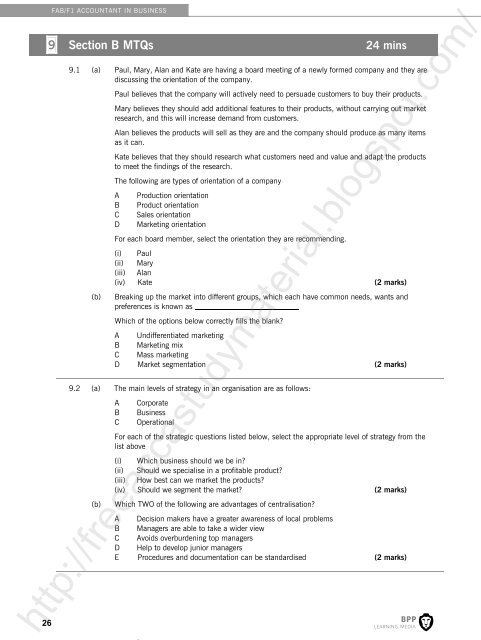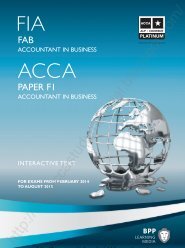FIA ACCA
Create successful ePaper yourself
Turn your PDF publications into a flip-book with our unique Google optimized e-Paper software.
26<br />
FAB/F1 ACCOUNTANT IN BUSINESS<br />
9 Section B MTQs 24 mins<br />
9.1 (a) Paul, Mary, Alan and Kate are having a board meeting of a newly formed company and they are<br />
discussing the orientation of the company.<br />
(b)<br />
Paul believes that the company will actively need to persuade customers to buy their products.<br />
Mary believes they should add additional features to their products, without carrying out market<br />
research, and this will increase demand from customers.<br />
Alan believes the products will sell as they are and the company should produce as many items<br />
as it can.<br />
Kate believes that they should research what customers need and value and adapt the products<br />
to meet the findings of the research.<br />
The following are types of orientation of a company<br />
A<br />
B<br />
C<br />
D<br />
Production orientation<br />
Product orientation<br />
Sales orientation<br />
Marketing orientation<br />
For each board member, select the orientation they are recommending.<br />
(i) Paul<br />
(ii) Mary<br />
(iii) Alan<br />
(iv) Kate (2 marks)<br />
Breaking up the market into different groups, which each have common needs, wants and<br />
preferences is known as<br />
Which of the options below correctly fills the blank?<br />
A Undifferentiated marketing<br />
B Marketing mix<br />
C Mass marketing<br />
D Market segmentation (2 marks)<br />
9.2 (a) The main levels of strategy in an organisation are as follows:<br />
(b)<br />
A<br />
B<br />
C<br />
Corporate<br />
Business<br />
Operational<br />
For each of the strategic questions listed below, select the appropriate level of strategy from the<br />
list above<br />
(i) Which business should we be in?<br />
(ii) Should we specialise in a profitable product?<br />
(iii) How best can we market the products?<br />
(iv) Should we segment the market? (2 marks)<br />
Which TWO of the following are advantages of centralisation?<br />
A Decision makers have a greater awareness of local problems<br />
B Managers are able to take a wider view<br />
C Avoids overburdening top managers<br />
D Help to develop junior managers<br />
E Procedures and documentation can be standardised (2 marks)<br />
http://freeaccastudymaterial.blogspot.com/





